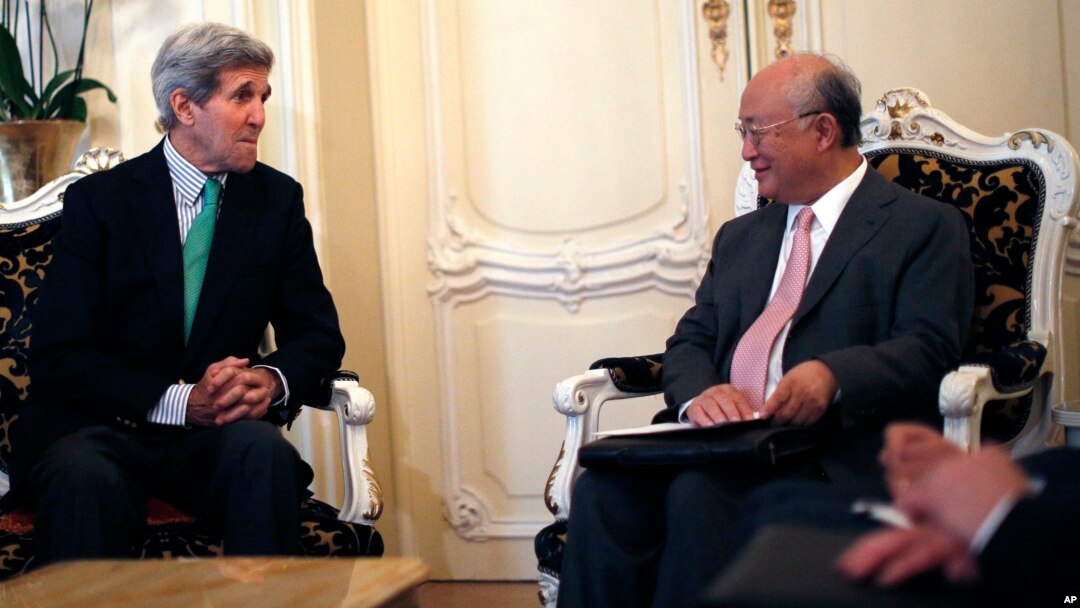A senior U.S. administration official says Iran nuclear negotiators are not looking for a long-term extension to talks that had an original deadline of June 30.
But the official said it would be no "surprise" if negotiators missed the Tuesday deadline by more than two days, noting that what is currently under negotiation is considerably more detailed than the April 2 plan from Lausanne, Switzerland. That set the parameters for a final agreement.
The official commented in a Vienna briefing on Monday, the eve of the self-imposed deadline for a comprehensive agreement that would curb Tehran’s ability to produce nuclear weapons in exchange for sanctions relief.
“This is staggeringly consequential for everybody,” the official said.
"This is incredibly consequential for the national security of the United States. This is quite consequential for the national security of all of the P5+1 partners, the regions, the Middle East, the world and for Iran," the official added.
WATCH: Pam Dockins reports from the scene in Vienna, Austria
Your browser doesn’t support HTML5
On The Scene: Iran Nuclear Talks Likely to Go Into Overtime
Few details
Negotiators have been tight-lipped about details from the talks, but the sticking points are believed to include access that inspectors from the U.N.'s nuclear agency would have to Iranian sites as well as the pace at which sanctions against Iran would be lifted.
There have also been concerns about managed access – how quickly International Atomic Energy Agency (IAEA) inspectors could be cleared to visit suspected sites.
In Monday’s briefing, the administration official said the world powers engaged in talks with Iran had added a procedure to the plan of action under discussion that would ensure IAEA inspectors would get managed access when they believed they needed it.
U.S. Secretary of State John Kerry led the delegation that met with Yukiya Amano, the IAEA director general.
As he headed into talks at the ornate Palais Coburg hotel, Kerry said, "We are just working and it is too early to make any judgments."
When asked if he expected the nuclear negotiators to reach an agreement, he said, "We will see."
Notably absent on Monday was Iranian Foreign Minister Mohammad Javad Zarif. He flew back to Tehran late Sunday but is expected to return to Vienna Tuesday.
Iranian state media reports say his trip home had been planned in advance.
Kerry and Zarif met several times on Sunday. Kerry also met with other officials, including British Foreign Secretary Philip Hammond and Germany's Foreign Minister Frank-Walter Steinmeier.
Officials taking part in the Iran nuclear talks speak to the media outside the Palais Coburg hotel, Vienna, Austria, June 28, 2015. (Brian Allen/VOA)
Likely to continue
On Sunday, officials from Iran, the U.S. and European delegations acknowledged that talks were likely to continue past the self-imposed Tuesday deadline.
EU foreign policy chief Federica Mogherini told reporters that the talks had "always been tough," but that negotiators could reach an agreement if there is "strong political will."
Delays have been the norm during the multiyear process that has brought Iran and the group of countries that includes the U.S., Britain, China, France, Russia and Germany to this point in their talks.
Media crowd outside the venue for the Iran nuclear talks, the Palais Coburg hotel, Vienna, Austria, June 28, 2015. (Brian Allen/VOA)
In a VOA interview, State Department Senior Adviser for Strategic Communications Marie Harf said Kerry and the Iranians understand that they have reached a critical moment.
"We have some really tough work still left to do," said Harf.
Some diplomats say the real deadline for finalizing an agreement is July 9. After that, the period of time the U.S. Congress has to review the agreement would extend from 30 to 60 days.
Families make pleas
On the sidelines of the nuclear talks on Monday, family members of detained Iranian-American Amir Hekmati made a passionate plea for his return, urging Kerry and Zarif to take up his plight during their talks.
"I want my brother home," said Hekmati’s sister, Sarah Hekmati.
"I want my dad to hold his son again. I want Mom’s heart to stop breaking…. I want this nightmare to end," she said.
Relatives said they fear Hekmati contacted tuberculosis while in prison.
Iranian officials arrested Hekmati in 2011 and charged him with espionage. He is one of three American citizens being held in Iran.
The senior administration official said that Kerry has had "direct" conversations with Zarif about the missing Americans and that U.S. officials work on their behalf on a daily basis.


